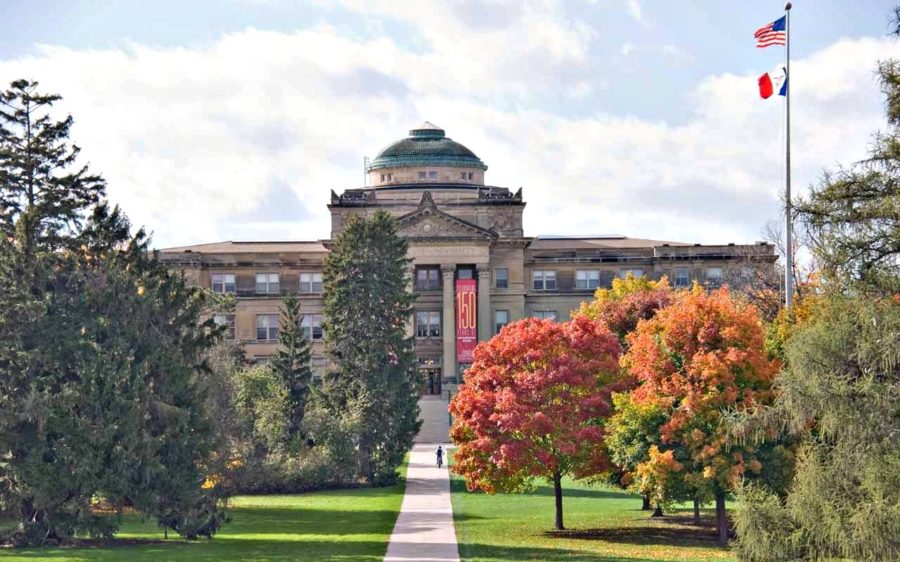Iowa State implements new COVID-19 safety protocols for fall semester
August 4, 2020
Iowa State President Wendy Wintersteen named an executive committee on fall planning to develop and implement plans to reinstate teaching and research programs on campus for the fall 2020 semester.
According to the Iowa State COVID-19 Response website, the executive committee used its guiding principles and worked closely with Emergency Operations Center Working Groups, which include representatives from the Faculty Senate, Professional and Scientific Council, Student Government and Graduate and Professional Student Senate.
Face coverings and community expectations
Cloth face coverings and/or face shields are required anytime students, faculty and staff are in the presence of others and anywhere they can’t maintain a six foot distance from someone — indoors or outdoors. Campus buildings will have signage to remind students.
The Dean of Students Office, working with the Academic Continuity Workgroup, has developed a set of community expectations, which provides guidance for handling issues of noncompliance. Faculty and staff should contact their own supervisor when the situation involves another staff or faculty member. Modeling appropriate behavior and creating positive reinforcement are the best methods to encourage compliance.
Based on the university’s June 24 announcement, the following expectations apply to all community members.
- Appropriate face coverings must be worn by all individuals within university classrooms and offices. In addition, face coverings are required on all other university property whenever physical distancing is not possible.
- The university is providing two cloth face coverings to all students, faculty and staff who request them, free of charge. Face shields can also be requested.
- The university has implemented various measures to help facilitate physical distancing practices. All members of the campus community are expected to cooperate and help in maintaining physical distancing wherever expected and possible. The university recognizes that maintaining at least six feet of physical space between persons may not be possible in all spontaneous and informal situations but expects the campus community to demonstrate a concerted effort to abide by all physical distancing measures including, following traffic patterns as indicated, respecting room occupancy limits and being mindful of one’s surroundings.
- Community members who are sick or experiencing any symptoms should not attend class or go to work. Individuals who are feeling sick or symptomatic should stay home, contact their instructor or supervisor, take care of themselves and seek medical care if necessary. Students who are feeling sick or symptomatic should contact Thielen Student Health. The university is expecting instructors to implement flexible attendance and makeup policies and simultaneously expecting students to use this flexibility for appropriate absences only.
Transportation services
There have also been decisions made related to university-related transportation.
When it comes to CyRide, masks or face coverings are required on CyRide buses to help prevent the spread of COVID-19.
CyRide has also implemented a series of cleaning protocols.
“At CyRide, our first priority is the safety of passengers, employees and community members,” according to the CyRide website. “When novel coronavirus approached Iowa, we moved quickly to upgrade cleaning protocols and frequency. CyRide crews now disinfect every bus using battery-powered backpack sprayers containing Ecolab FaciliPro. The sprayers apply a static charge to help pull disinfectants to the entire surface. They disinfect all areas of the bus, including high-touch surfaces — such as buttons, handholds, pull cords, rails, and stanchions — and the transit driver’s work area. This means every morning passengers and drivers board fully disinfected buses across Ames.”
For other university-related transportation, all vehicle occupants must wear face coverings and sit as far apart as the vehicle allows. This includes university-owned commuter van pools.
University-owned vehicles should be used instead of personal vehicles wherever possible and all drivers and passengers are expected to wash or sanitize their hands before and after each trip.
Cleaning
The university has also announced an investment of nearly $3 million for enhanced cleaning and disinfection during the fall semester. This investment includes the hiring of additional full-time and student staff, who will be focused on preventing infection in restrooms, classrooms, common areas, elevators and other at-risk spaces.
In general:
- Common areas, including corridors, atriums, stairwells and elevators will be fully cleaned once a week. Frequently touched surfaces such as door handles, drinking fountains, stairwell railings and elevator buttons will be cleaned and disinfected daily, Monday through Friday.
- Restrooms will be cleaned and disinfected every day, Monday through Friday.
- Instructional spaces, including classrooms, auditoriums, teaching laboratories, open laboratories and seminar rooms will be cleaned and disinfected every day, Monday through Friday.
- High-use areas in the Parks Library will be cleaned and disinfected twice each day, Monday through Friday.
In Department of Residence and ISU Dining facilities:
- Community bathrooms will be deep cleaned daily with a secondary sanitization.
- Common areas will be cleaned and sanitized daily, focusing on high-touch surfaces.
- Cleaning and sanitizing supplies will be available for student use in all community bathrooms, suites, apartments and available at hall/apartment desks.
“All ISU employees have shared responsibility to keep their personal work areas and the common areas of their workplaces clean and safe,” according to the Iowa State COVID-19 Response website. “Clean and disinfect your personal work area, including lab areas and computer equipment, regularly. Clean and disinfect common space or shared equipment regularly. Pay special attention to controls and frequently touched surfaces e.g., printer or copier touchscreens, A/V and other electrical equipment, desks, tables, light switches, door handles.”







